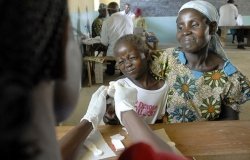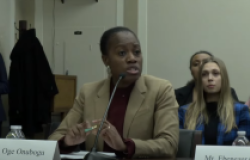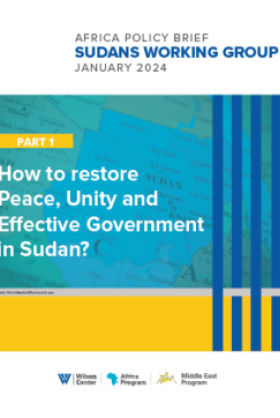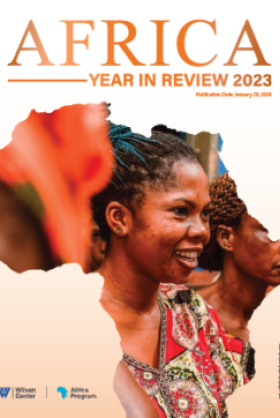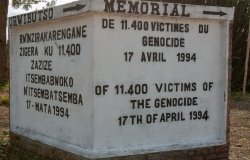Peace Mapping in Somalia
Jabril Ibrahim Abdulle, director, Center for Research and Dialogue; Mark Bradbury, co-editor, Accord 21 Report; Pat Johnson, Senior Program Officer, Interpeace Somali; Ken Menkhaus, Professor of Political Science, Davidson College; Abdirahman Osman Raghe, co-founder, WSP International (now Interpeace); Scott Weber, Director-General, Interpeace; Steve McDonald, Consulting Director, Africa Program, (moderator)
Overview
Since the overthrow of President Siad Barre in 1991, opposing clans in Somalia have engaged in a continuous struggle for power. In the process there have been countless deaths and the number of displaced persons rises daily. The Office of the United Nations High Commission for Refugees (UNHCR) claims that in 2010 alone, 63,000 Somalis have fled their homes. The current transitional government, led by Sheikh Sharif Sheikh Ahmad, teeters precariously on the edge as it works to bring peace to Somalia, all while balancing the interests of clan leaders, Islamist groups such as al-Shabab, and the powerful Somali Diaspora.
But while national reconciliation and peace building efforts are constantly flirting with failure, there is a quieter movement towards peace at the local level, where clan leaders deal with disputes amongst themselves, and have succeeded in rebuilding old friendships and forming new alliances. On Thursday, January 28, 2010, the Woodrow Wilson International Center for Scholars and Interpeace came together to discuss these growing initiatives, over 90 of which have succeeded in bringing peace to the South Central Somali regions. Scott Weber introduced Interpeace's recently completed 3-year study aimed at getting a better understanding of this society that is collapsing from within. He pointed out that peace is only sustainable when it is really owned by society and by the main actors in the country, and for that reason it is important to understand what Somalis want and what their understanding of peace really is. Connecting with local partners, Interpeace studied how Somalis solve their problems so that leaders in Somalia and the international community can come up with a better approach to the peace and reconciliation process in this country.
Pat Johnson gave a brief overview of the schematics of the five volume study, which consisted of eleven case studies that take an in depth look at different examples of peace initiatives, resulting in a rich and complex overview of how Somalis make peace. There is much to learn from this study in terms of international engagement at different levels of the Somali peace process. Features include a process oriented incremental approach; respective leadership in the committees that oversee management; inclusivity to bring in all kinds of stakeholders, from the business sector, media, women and youth and religious and traditional leaders; and finally inclusion of spoilers. This kind of consensus based approach takes time, but once an accord is reached there is both buy in and ownership by the parties involved. While the most primary and pressing objective is to end violence and restore public security, the approach is through restitution and restorative justice rather than retribution. Johnson showed several clips of the film resulting from the study, which emphasized the importance of restoration and representation of communities in this process. Women were highlighted as major players in the process. Conflicts between clans mainly concern settlement disputes in terms of rights to grazing lands or water, and the film showed how neighboring communities sometimes intervene in clan conflicts to negotiate peace.
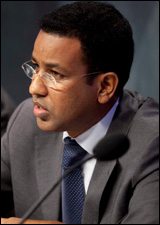 This film was a brief glimpse into another facet of what is going on in Somalia today, rather than the constantly negative portrayals of the media. Jabril Ibrahim Abdulle spoke of the reality on the ground as well as Interpeace's involvement in the region. On the ground, he said, life goes on, that people are moving forward. Interpeace organized a meeting in Mombasa bringing together three generations of Somalis, including members of the Somali Diaspora, the business community and civil society. While many issues were discussed, the most important result was renewed communication amongst these different generations and communities. Important issues discussed included the importance of Somali culture and the issue of terror and those who use it in Somalia. Although Somalis are ready for peace, Abdulle questioned how this can be channeled into a national peace process.
This film was a brief glimpse into another facet of what is going on in Somalia today, rather than the constantly negative portrayals of the media. Jabril Ibrahim Abdulle spoke of the reality on the ground as well as Interpeace's involvement in the region. On the ground, he said, life goes on, that people are moving forward. Interpeace organized a meeting in Mombasa bringing together three generations of Somalis, including members of the Somali Diaspora, the business community and civil society. While many issues were discussed, the most important result was renewed communication amongst these different generations and communities. Important issues discussed included the importance of Somali culture and the issue of terror and those who use it in Somalia. Although Somalis are ready for peace, Abdulle questioned how this can be channeled into a national peace process.
Two dominant themes emerged as a result of this discussion: the current and potential role of the Diaspora and that of civil society in peace building. Historically, the Somali Diaspora has been one of the most involved and aware in the world. Many of the good and bad things happening in Somalia right now involved the actions of the Diaspora, in that they have built schools and hospitals and provided services, but in the end cannot sustain them. Many are taking an active role in the peace building process, some even seeking leadership roles. Ken Menkhaus believes that while the Diaspora is intricately involved with activities in Somalia, that they are severely disenchanted by their new home governments, a relationship he sees as problematic. Somalis are not bringing the ideals of these effective governments back to the discourse on the creation of a viable Somali state. Divisions amongst the Diaspora run deep, but it remains powerful nonetheless. It is often said that leaders - political and religious - supported by the Diaspora will win in Somalia, an argument exemplified by the rise to power of the Islamic court. In this sense engaging the Diaspora is an essential element of the peace building process. Civil society also possesses valuable skills, though they have been targets of violence in recent years. Civil society has attempted to continue providing health and social services, amon other services, but recently many have been attacked and killed, while others have fled the country.
Mark Bradbury pointed out several lessons that could help in taking on this challenge. Looking at the relative success of local peace initiatives and the failure of international ones, one key issue is that of ownership. It is important to consider the fact that the process is locally designed, mediated and financed and to keep in mind issues of inclusivity, accountability and reconciliation. Reconciliation was highlighted as a prerequisite for government as opposed to the traditional international approach which assumes that reconciliation will occur once a government has been put in place. The second lesson was that of the international handling of security governance, in that ceasefires have been generally negotiated in addition to a peace accord rather than as a part of it. Finally, there is the issue of addressing governance issues by reestablishing social contracts based on traditional roles. Abdirahman Osman Raghe noted that all of these steps need to be understood within the context of the Somali people. There are children in Somalia who have never known peace, and the complexity of this issue is exacerbated by this generation that doesn't necessarily recognize its importance. The Somali crisis has been regionalized and internationalized, and is no longer just a Somali issue. Menkaus also had difficulty reconciling these conflicting images of Somalia: the basket case of problems, humanitarian issues and refugees, and the vibrancy of the local community and their ability to reach peace. Menkhaus looked to the local level for issues in governing a national process. Somalis have never really been given the chance to solve critical issues or make their own decisions, while nationalized approaches have historically ignored such issues as human security and the importance of accountability in the name of state building. State building has always come first, but local initiatives could be beneficial given the limited reach of the central governing authority. Grassroots peace building could be the genesis of a new Somali state on its own terms. This fragile process should neither be ignored nor have too many resources thrown at it; rather civil society should be promoted.
A final key to the peace and reconciliation process is the avoidance of a victor's peace. According to Menkhaus, too many areas in Somalia are peaceful because rule has been imposed upon the area. Members of aggrieved groups are those that are being recruited by al-Shabab either because of ideology or because they see al-Shabab as the only group that can address their grievances. While there is plenty of evidence regarding the impact of al-Shabab on local peace, there is also evidence that it is not in a position to directly confront local authorities. Al-Shabab has not made an effort to govern the territories it controls, though it has provided better public security than before. In any case, a victor's peace is no longer a viable option in Somalia. These local initiatives have taken Somalia from a collapsed state to a fragile state, and though the future of peace building in Somalia remains uncertain, it is believed that engagement with these communities and an emphasis on homegrown initiatives will have profound impacts on this transitional period. Engagement amongst local groups resulted in the Mombasa Declaration of the Principles of Peace, but their implementation will require a serious commitment from all groups within Somalia as well as the full support of the international community.
Documents & Downloads
Hosted By

Africa Program
The Africa Program works to address the most critical issues facing Africa and US-Africa relations, build mutually beneficial US-Africa relations, and enhance knowledge and understanding about Africa in the United States. The Program achieves its mission through in-depth research and analyses, public discussion, working groups, and briefings that bring together policymakers, practitioners, and subject matter experts to analyze and offer practical options for tackling key challenges in Africa and in US-Africa relations. Read more
Thank you for your interest in this event. Please send any feedback or questions to our Events staff.




